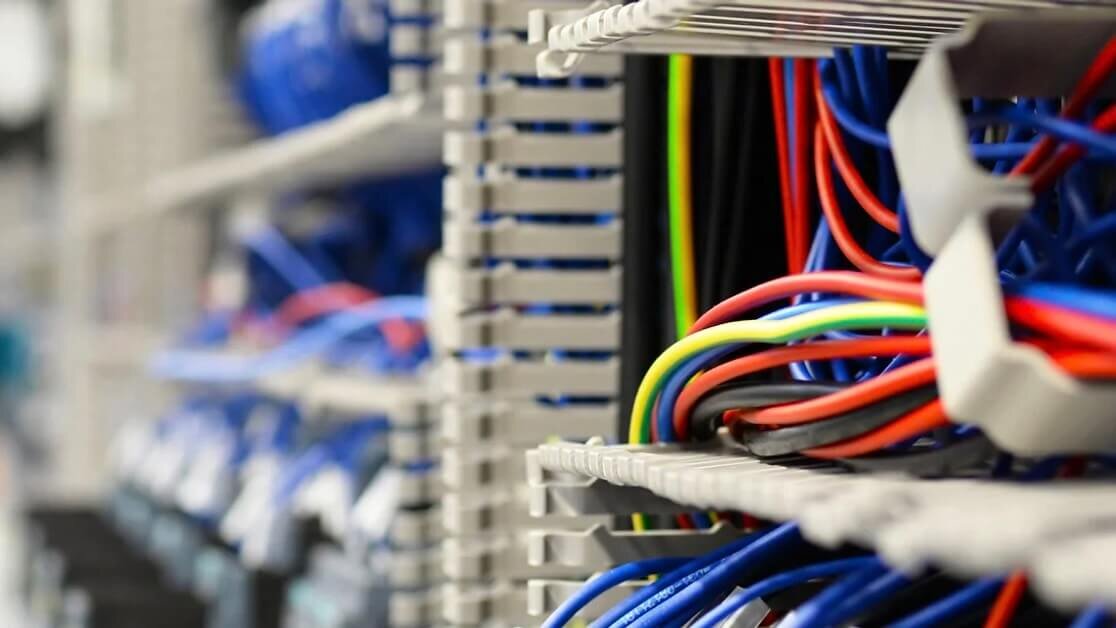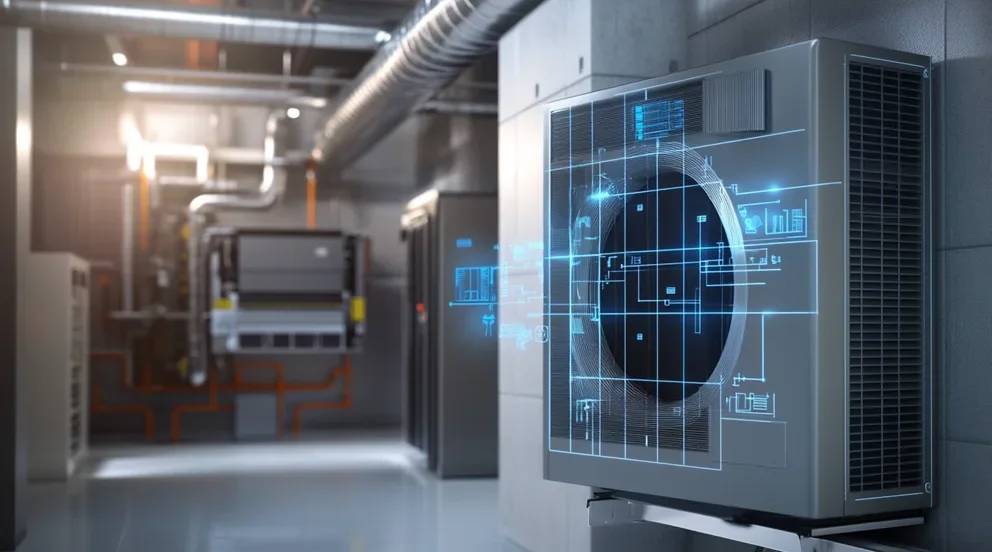Billing is the foundation of your cash flow in the fast-paced world of the HVAC industry, and it goes beyond simply issuing invoices and monitoring payments. The right HVAC billing software integrates invoicing and payment management into one seamless process, cutting down on manual errors, getting you paid faster, and giving your team the tools to handle every job with confidence. Whether you’re managing commercial contracts, residential calls, or multi-stage projects, a robust billing system ensures nothing slips through the cracks.
It might be difficult to go through the many possibilities when selecting HVAC billing software, but it all boils down to what suits your particular business. Think about what you need: Is automating invoices your top priority? Do you want to make payment processing easier for your customers? Or are you looking for a tool that balances both while giving you clear financial insights? Let’s break it down so you can find the perfect fit.
- Choosing HVAC billing software
- 4 key features to look for in HVAC billing software
- Best HVAC billing software for commercial
- Best HVAC billing software for residential
- Best HVAC billing software for general contractors
- Other notable HVAC billing software providers
- 5 benefits of using HVAC billing software
- 5 important HVAC billing software FAQs answered
In this guide, we’ll help you navigate the world of HVAC billing software so you can find the right fit for your business. From key features to standout options for different contractor types, we’ve got everything you need to make an informed decision. Let’s dive in.
Choosing the right HVAC billing software for you
There is no one-size-fits-all solution for HVAC billing software. The particular requirements of your company will determine the best course of action. To assist you in making the best decision, keep the following points in mind as you consider what your business needs in a tool:
- Supported payment types - Can your customers pay with credit cards, ACH transfers, or digital wallets? Offering multiple payment options ensures your clients can settle invoices on their terms, making payments faster and more reliable.
- Automated processes - Does the software send out invoice reminders automatically? Can it track overdue payments or manage recurring billing without manual effort? Automation reduces repetitive tasks, giving you more time to focus on growing your business.
- Integration with other tools - Will the billing software work seamlessly with your scheduling, dispatch, and accounting systems? Integration is crucial to ensure all parts of your operation stay connected, improving efficiency and eliminating redundancies.
- Scalability - Whether you’re handling 10 jobs a month or 100, your billing software should grow with you. Look for solutions that can manage higher volumes of invoices, payments, and client data as your business expands.
- Features Outside of Invoicing - What specific features does the software offer, and how do they align with your daily operations? Does it provide tools tailored to your type of work—like customer portals for residential contractors or detailed reporting for commercial jobs? If you’re managing both, can it handle the flexibility of switching between residential and commercial needs? Most importantly, does it offer features that actually save time, simplify processes, and help you deliver better service?
By asking the right questions and focusing on what your business truly needs, you can choose HVAC billing software that doesn’t just meet expectations but sets your operations up for long-term success.
Important
HVAC invoicing and billing is a process with a lot of components, and the right software is only one of them. Be sure to check out our complete guide to HVAC invoicing to learn about the other components you should be focusing on to help improve your business operations.
4 key features to look for in HVAC billing software
When choosing HVAC billing software, it’s critical to focus on tools that streamline operations and deliver measurable results. Here are four essential features to keep in mind:
1. Invoicing
Effective software allows you to create professional, itemized invoices in just a few clicks. Even better, tools with automation send reminders to clients, ensuring nothing gets overlooked.
Your ability to control the timing for sending out invoices is also key. Our study of thousands of invoices shows that invoices sent within the first 10 days of completing a job are significantly more likely to get paid faster. This "invoicing sweet spot" ensures cash flow stays steady and predictable, which is vital for growing businesses. Missing this crucial window could mean weeks of delays in your revenue stream.
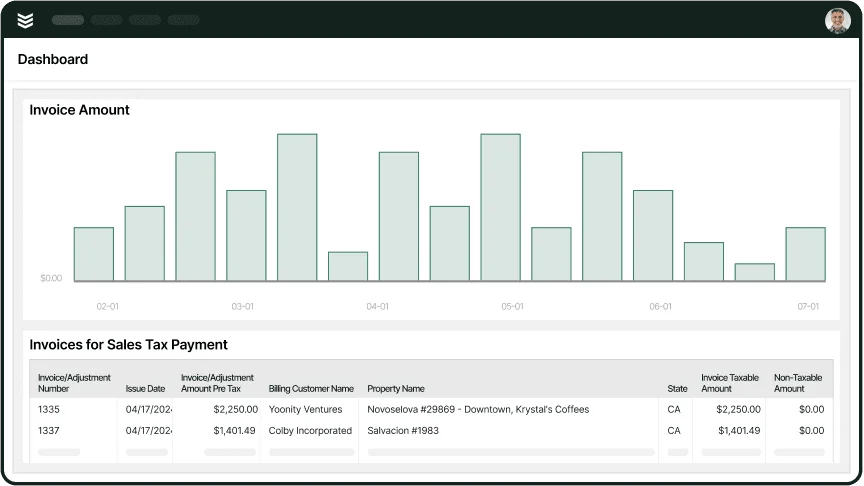
Get paid faster with BuildOps
Streamline HVAC billing so payments are always on time — never delayed.
2. Payment management
Payment management solutions ensure you’re always a step ahead. By supporting multiple payment methods—like credit cards, ACH transfers, or digital wallets—the best billing tools make it easier for your customers to pay on time. Combine this with automated reminders, and you’ll spend less time chasing payments and more time running your business.
3. Customer management
Your clients expect a seamless experience, and effective customer management features make that possible. With tools that store service history, payment habits, and contact details in one place, you can deliver personalized service while reducing manual effort. Having easy access to this data also helps you resolve disputes faster and improve client satisfaction.
4. Reporting & analytics
A clear view of your business’s financial health is a priority. Billing software with robust reporting features provides insights into overdue invoices, payment trends, and cash flow. These analytics let you identify problem areas, such as late-paying customers, and adjust your strategy to maximize revenue.
Other valuable billing features for HVAC businesses
- Mobile Access - Having an HVAC invoicing app with a mobile-friendly interface lets contractors manage invoicing, payments, and customer data directly from the field. This convenience ensures that tasks can be completed on the go, saving time and improving efficiency.
- Recurring Billing Setup - A recurring billing feature automates invoices and payments for clients with regular maintenance contracts. This reduces administrative tasks while ensuring consistent revenue streams.
- Customizable Invoice Templates - Customizing invoices with your company logo, colors, and style adds a professional touch. It also helps reinforce your brand identity and leaves a strong impression on clients. Check out our guide to HVAC invoicing templates for sample templates you can use or customize to help with this process.

Check out the Invoicing Toolkit
Find out exactly what you need to execute smooth, seamless billing and invoicing.
Best HVAC billing software for commercial contractors: BuildOps
BuildOps billing software is a comprehensive solution that seamlessly combines invoicing and payment management into one streamlined platform. Designed specifically for commercial contractors, it simplifies high-volume, complex billing tasks while integrating with your operational workflows. From creating professional invoices to tracking payments, we ensure every aspect of your billing process works together to keep your cash flow steady.
How Pricing Works: We offer weekly live demos and the option to request for one to explore features and find a tailored solution that is fit for your needs.
Features Beyond Invoicing:
- Advanced payment tracking and automated reminders
- Real-time reporting for actionable cash flow insights
- Customer and contract management tools
What Sets it Apart for Commercial: BuildOps stands out by addressing the unique challenges of commercial operations. It handles multi-location client billing, automates repetitive tasks, and integrates seamlessly with scheduling and dispatch systems—all while keeping invoicing and payments at the core of your operations.
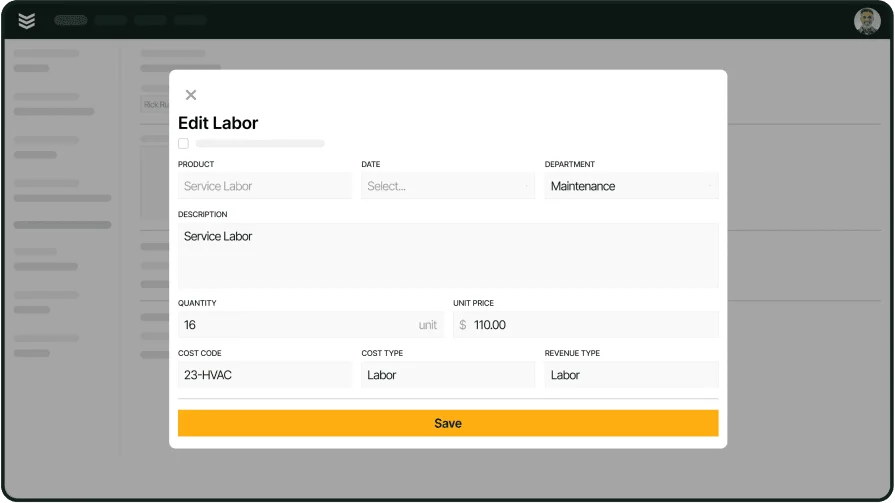
Always get paid on time
Supercharge your HVAC billing, saving time through automation.
Best HVAC billing software for residential: Kickserv
Image Source: Kickserv
Kickserv is designed for residential contractors who need a straightforward and user-friendly billing system. Its intuitive interface makes invoicing and payment tracking effortless, allowing contractors to focus on providing exceptional customer service.
How Pricing Works: Kickserv offers tiered pricing plans based on the size of your business, with options for growing teams and individual contractors.
Features Beyond Invoicing:
- Customer relationship management (CRM) tools
- Scheduling and job tracking capabilities
- Online payment portals for client convenience
What Sets it Apart for Residential: Kickserv prioritizes ease of use, offering features like customer portals and simple job tracking that align perfectly with the needs of residential contractors managing one-on-one relationships.
Learn more about how you can collect cash quicker with Kickserv.
Best HVAC billing software for general contractors: Sera
Image Source: Sera
Sera specializes in helping general contractors manage diverse projects with ease. Its billing software is equipped to handle multi-stage projects, keeping invoicing accurate and on schedule for complex operations.
How Pricing Works: Sera provides custom quotes based on your operational needs and the size of your business.
Features Beyond Invoicing:
- Real-time job cost tracking
- Automated scheduling for project phases
- Integration with accounting platforms
What Sets it Apart for General Contractors: Sera’s flexibility in managing both large-scale projects and smaller tasks makes it an excellent choice for general contractors needing precision and efficiency.
Using a single gateway, handle deposits, disputes, and financial information while accepting payments from any location with the Sera app.
Other notable HVAC billing software providers
Here’s a look at other popular billing software options for HVAC contractors, each with its own strengths.
Tradify: for small businesses
Image Source: Tradify
Tradify is an all-in-one tool designed for small trade businesses, offering easy-to-use features that simplify billing and job management.
How Pricing Works: Tradify provides subscription-based pricing, with a flat monthly rate that includes all essential features.
Features Beyond Invoicing:
- Time tracking for accurate job costing
- Team scheduling tools
- Quoting and estimation features
What Sets it Apart for Small Businesses: Tradify’s simplicity and affordability make it a great fit for smaller HVAC teams looking for essential tools without unnecessary complexity.
Jobber: for a better customer experience
Image Source: Jobber
Jobber combines invoicing, scheduling, and customer management in a polished platform that helps service businesses thrive.
How Pricing Works: Jobber offers tiered subscription plans, starting with a core set of features and scaling up for larger teams.
Features Beyond Invoicing:
- CRM tools for better customer interactions
- Mobile app for managing tasks on the go
- Workflow automation for repetitive tasks
What Sets it Apart for Service Businesses: Jobber is perfect for HVAC businesses with a focus on streamlining operations and delivering excellent customer experiences.
mHelpDesk: seamless communication
Image Source: mHelpDesk
mHelpDesk provides a comprehensive solution for managing billing, scheduling, and field service operations in one platform.
How Pricing Works: mHelpDesk offers custom pricing based on the size of your business and the features you need.
Features Beyond Invoicing:
- Integrated field service management tools
- Real-time job tracking and updates
- Built-in estimates and quotes functionality
What Sets it Apart for Field Teams: mHelpDesk excels at keeping office and field teams in sync, ensuring seamless communication and operations.
5 benefits of using HVAC billing software
For HVAC companies, billing software not only makes things easier, it also changes the way you handle cash flow and operations. Here’s how it can make a big difference:
1. Improved efficiency and accuracy
Automating your billing process reduces errors caused by manual data entry, ensuring invoices are accurate the first time. For HVAC contractors juggling multiple jobs, this means fewer billing disputes and more time to focus on delivering great service.
2. Automated payment tracking
With HVAC billing software, tracking payments is no longer a guessing game. The system monitors which invoices are paid, overdue, or outstanding. This keeps your finances organized and eliminates the need to manually sort through spreadsheets or paperwork.
3. Outstanding payment reminder notifications
Late payments slow cash flow, but automated reminders make sure your clients never forget their dues. HVAC billing software sends timely notifications to customers, saving you from awkward follow-ups and ensuring faster payment cycles.
4. Receive payments faster
Integrated payment processing options—such as credit cards or ACH transfers—let your clients pay quickly and easily. Combined with timely invoicing, this reduces payment delays and keeps cash flow steady, a must for HVAC businesses managing multiple jobs.
5. Streamlined invoice customization
Your invoices should reflect the professionalism of your HVAC business. Billing software allows you to create customized, branded invoices that include details like itemized costs and service descriptions. This not only enhances your brand but also helps customers understand charges clearly, leading to quicker approvals.
Deep Dive
Don’t just take our word for it, see how companies benefit from automated invoicing. Take a look at these HVAC invoice examples for inspiration on how you might want to customize your invoices with software.
5 important HVAC billing software FAQs answered
Implementing billing software for your HVAC business can feel like a big step, but the right tools and understanding make all the difference. Here are answers to common questions HVAC contractors have about billing software:
1. What is HVAC billing software?
HVAC billing software is a tool designed to automate and streamline billing processes, including creating invoices, tracking payments, and managing customer accounts. It combines invoicing and payment features to improve efficiency and accuracy for HVAC businesses.
2. How does HVAC billing software work?
HVAC billing software works by automating tasks like invoice generation, payment tracking, and customer notifications. It simplifies data entry and integrates with scheduling and field service tools to provide real-time updates, ensuring every billing process is synced with your operations.
3. Who needs HVAC billing software?
Any HVAC business—whether residential, commercial, or general contractors—benefits from billing software. It’s especially useful for companies looking to reduce errors, speed up payments, and gain insights into their financial health through detailed reporting.
4. Are there any restrictions or compliance requirements to know when using HVAC billing software?
Yes, HVAC businesses must ensure their billing software complies with regional tax laws, such as sales tax regulations, and industry standards like labor and service reporting. Additionally, ensuring that the software adheres to data protection laws (e.g. GDPR or CCPA) is essential for safeguarding customer information.
5. What are some best practices to follow when implementing an HVAC billing software?
Start by training your team to use the software effectively, focusing on key features like invoicing and payment tracking. Customize the software to match your business needs, such as integrating with scheduling tools or automating reminders. Regularly review reports to identify trends and improve your billing process.
The right HVAC billing software can completely change the game for your business. Automating invoicing and tracking payments is just the start—BuildOps helps you boost cash flow, sharpen operations, and strengthen customer relationships all in one go.
Need advanced reporting? Done. Client management? Covered. Seamless invoicing and payments? Easy. And let’s talk about the extras—like real-time dashboards and multi-location billing. Other tools make those feel like a luxury, but with our HVAC invoicing software and payment solution for contractors, they’re all part of the deal. It’s built to handle the way HVAC companies really work, making your job simpler, faster, and way more efficient.
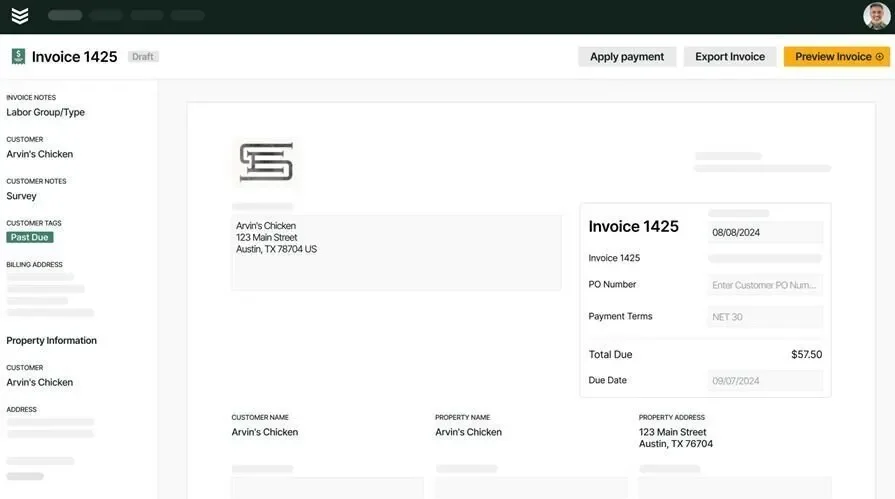
Take a closer look and see it in action
We’ll take the headache out of billing and give your business a boost.



